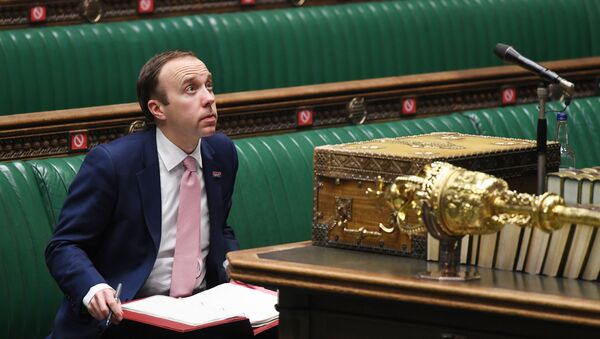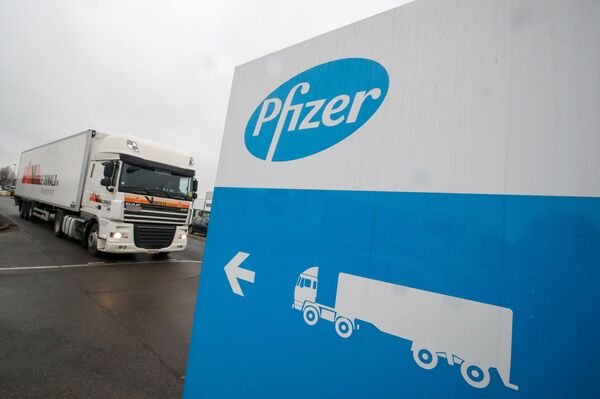The UK's rapid rollout of a Pfizer COVID-19 coronavirus vaccine could see restrictions relaxed before the end of March 2021, London's Health Secretary, Matt Hancock said on Sunday
Speaking to the Sunday Telegraph, Hancock said he "can’t wait to scrap this tiered system altogether" and for the country to return "to living by mutual respect and personal responsibility, not laws set in Parliament".
“There’s no doubt that having the vaccine early will bring forward the moment when we can get rid of these blasted restrictions, but until then we have got to follow them. Help is on its way".
The tiers will be "loosened" by the end of the March? That's when the sunset clause for the Covid legislation falls anyway. I think Matt Hancock will find the British people will be WAY ahead of him on the loosening... Patience is wearing thinner every day. https://t.co/5FlPyu0SWR
— Julia Hartley-Brewer (@JuliaHB1) December 5, 2020
The UK Health Secretary said that the "majority of the vaccination [of the vulnerable] will be in January and February, and the scale of that depends on Pfizer’s manufacturing facilities, MHRA’s approval of AztraZeneca and AstraZeneca’s manufacturing capabilities".
“The speed at which we vaccinate obviously is determined by how fast the manufacturer can produce it", he added.
He claimed that he had assigned the NHS with the "simple mission of vaccinating as quickly as the manufactures can produce".
“We’ll keep watching what happens to the epidemic".
Hancock expressed his wish that the more people vaccinate, the fewer deaths will occur and therefore a quicker end to pandemic lockdown restrictions.
The Health Secretary has developed a reputation, to the dismay of many Conservative backbenchers, as a leading proponent of stringent lockdown measures introduced to slow the pandemic.
Help is on its way.
— Matt Hancock (@MattHancock) December 2, 2020
The MHRA has formally authorised the Pfizer/BioNTech vaccine for Covid-19.
The NHS stands ready to start vaccinating early next week.
The UK is the first country in the world to have a clinically approved vaccine for supply.
The Coronavirus Recovery Group (CRG) - a group of 70 Tory MPs that oppose harsh anti-pandemic measures - has called on the government ease restrictions even before all age groups are vaccinated.
“As the vaccine is rolled out and the most vulnerable are protected, the government should begin our national renewal by reducing the crippling restrictions on our economy and society", said the CRG chairman, Mark Harper.
Harper said that due to "the enormous costs of these restrictions, both in terms of individual lives and livelihoods" it is crucial that the vaccinations occur as quickly as possible as the country seeks to recover its "physical and economic health".
"If we have vaccinated those who are most vulnerable to COVID by then, why wait until Easter?”, he suggested.
According to The Express, an unnamed supporter of the CRG called on Prime Minister Boris Johnson to use "optimism" to move the country forward.
“If we wait until every 20 or 30 year old has had a vaccine before we remove restrictions, our economy may well resemble a Soviet relic", the anonymous supporter remarked. “Boris must channel his optimism into this country’s next chapter as soon as possible.”
Speaking to the Health and Social Care Committee in November, the Health Secretary was grilled by predecessor Jeremy Hunt, who asked how social distancing restrictions would change amid a vaccine rollout.
Hancock said that it would depend on the impact of the virus but that he hoped that restrictions could be lifted by November.
The current 3-tier system of coronavirus restrictions was introduced to slow the spread of the pandemic and prevent health services from being overwhelmed. Each tier is based on regional outbreak levels.
In December, the UK became the first country to deploy the Pfizer-produced vaccine and will administer the inoculation based on a levels system - care home residents and staff will be the first to receive the jab, followed by healthcare staff, then the oldest in the UK, before going down successively by age group.




